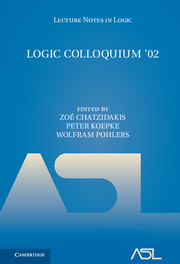Book contents
- Frontmatter
- Contents
- Preface
- Participants Photograph
- Generic absoluteness for Σ1 formulas and the continuum problem
- Axioms of generic absoluteness
- Generalised dynamic ordinals — universal measures for implicit computational complexity
- The Worm principle
- “One is a lonely number”: logic and communication
- Computable versions of the uniform boundedness theorem
- Symmetry of the universal computable function: A study of its automorphisms, homomorphisms and isomorphic embeddings
- PCF theory and Woodin cardinals
- Embedding finite lattices into the computably enumerable degrees — a status survey
- Dimension theory inside a homogeneous model
- Reals which compute little
- Bisimulation invariance and finite models
- Choice principles in constructive and classical set theories
- Ash's theorem for abstract structures
- Martin-Löf random and PA-complete sets
- Learning and computing in the limit
- References
The Worm principle
Published online by Cambridge University Press: 31 March 2017
- Frontmatter
- Contents
- Preface
- Participants Photograph
- Generic absoluteness for Σ1 formulas and the continuum problem
- Axioms of generic absoluteness
- Generalised dynamic ordinals — universal measures for implicit computational complexity
- The Worm principle
- “One is a lonely number”: logic and communication
- Computable versions of the uniform boundedness theorem
- Symmetry of the universal computable function: A study of its automorphisms, homomorphisms and isomorphic embeddings
- PCF theory and Woodin cardinals
- Embedding finite lattices into the computably enumerable degrees — a status survey
- Dimension theory inside a homogeneous model
- Reals which compute little
- Bisimulation invariance and finite models
- Choice principles in constructive and classical set theories
- Ash's theorem for abstract structures
- Martin-Löf random and PA-complete sets
- Learning and computing in the limit
- References
Information
- Type
- Chapter
- Information
- Logic Colloquium '02 , pp. 75 - 95Publisher: Cambridge University PressPrint publication year: 2006
References
Accessibility standard: Unknown
Why this information is here
This section outlines the accessibility features of this content - including support for screen readers, full keyboard navigation and high-contrast display options. This may not be relevant for you.Accessibility Information
- 6
- Cited by
